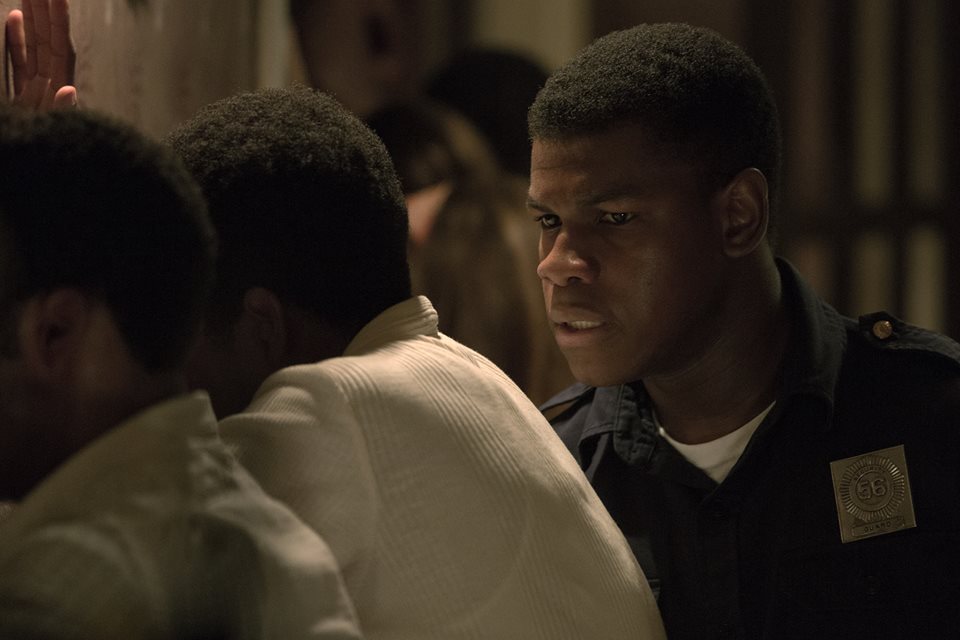HOLLYWOOD—Cinema has a unique ability to stir emotions in a viewer that other forms of entertainment can’t. If the story is told with as much authenticity as possible, characters shed their skin and the narrative weaves seamlessly from start to finish creating a masterpiece in the making. Well, Kathryn Bigelow is a testament to the powers of what a master filmmaker can do with the right script, actors and honing in on her powerful directorial skills.
Please understand I’m analyzing this movie from the scope of someone who was born in the city and raised in the city of Detroit, and who grew up in the city post the 1967 riots. Be warned, the events of the movie are inspired by real life events, how accurate those events are is questionable considering no concrete evidence backs up what is presented to the audience. “Detroit” is a movie that opens with a cartoon like depiction of life for African-Americans, specifically the scope of how things shifted over time for Blacks in Detroit.
I’ve gone back and forth with why that specific artistic approach was taken with a movie tackling a painful, disturbing and at times troubling film to watch. It was to lighten the mood until the actual drama exploded in front of the audience. That soon transitions to the event that led to the culmination of frustration of African-Americans in the city who decided to react after an after-hours establishment is raided by the police. Bigelow’s ability to capture the tension is relentless, and the fear from the officers is proof that fear was indeed beginning to cripple the city: not just its residents, but officials in power.
The film then transitions to utilizing real-life footage of looting, fires, destruction of property and the National Guard emerging in the city to control the violence that spanned over a period of five days. It is during these five days the audience is introduced to major players of the film including Larry Reed (Algee Smith), who was a member of the R&B group The Dramatics. Reed is an interesting character, who has high hopes of being discovered by Motown, but the riots in the city alter his career opportunities and puts him in a situation with his pal Fred (Jacob Lattimore) that forever changes his life.
We also meet Melvin Dismukes (John Boyega), who is a security guard at a grocery store who finds himself entangled in a mystery that alters his perception of cops and the legal system. Boyega brings an interesting character to life; as a viewer, you sympathize with him, but at the same time question his motives and intentions. As a spectator, you’re left asking rather you would do some of the things that Melvin does considering the situation that he is placed in? It’s polarizing, but perhaps the intention of the director.
We also meet Philip Krauss (Will Poulter), as a racist and vile Detroit police officer, who sees his career nearly ending after his involvement in the fatal shooting of a looter. Poulter really delivers a riveting performance of a character that many African-Americans today might pinpoint when it comes to accessing White police officers in America. His level of hatred for African-Americans is uncanny, not to mention the frustration the viewer grapples with knowing that he has superiors who are well aware of his antics.
“Detroit” takes its time building up to the big climax that transpires at The Algiers Hotel, where Carl (Jason Mitchell) and a group of pals decide that playing with a toy gun might not be a bad idea. That gun ultimately sets the stage for perhaps the most gripping 30-40 minutes in cinema that I have ever witnessed unfold on the screen. It’s painful and brutal to watch the events that unfold where, complete strangers see their lives altered by a racist police force, racist cops and quite frankly authorities who refuse to ‘intervene’ because of the fear of what may transpire. It goes with that notion that those who refuse to say something when they see something allow more madness and chaos to erupt in America. Just imagine how the events in the 1967 would unfold if we had cell phones.
Bigelow’s ability to capture this tense madness, without sugarcoating what is believed to have transpired is will strike audiences to the core. I was on the verge of exiting the theater because of the brutality of the events displayed, and I even witnessed some patrons exit the theater as the level of violence and brutality continued to escalate. The sore point for many Americans, probably minorities in particular is the notion that such events like this have transpired in recent years and have become more prevalent in our city. Police brutality still exists, rather people want to acknowledge it or not. Racism still exists in American rather people want to acknowledge it or not.
The script written by Bigelow’s partner in crime Mark Boal is sharp, poignant, and emotional; I would almost call it a perfect script, except I wanted just a bit more explanation leading to the buildup of the riots. I feel slightly cheated there, but beyond that we see these flawed characters, these complicated characters, characters who motives are not clearly revealed or divulged to the viewer.
Be warned “Detroit” is NOT an easy movie to watch, it’s not a movie for everyone, but it is indeed one of the best movies of the year, not to mention one of the most relevant films in the past 50 years. A dark deep secret that has been kept under wraps has been exposed with all its ugliness to shed light on a city that so many people think they know, but in reality they have no idea.






